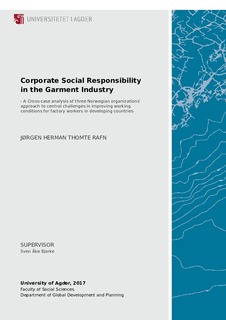| dc.description.abstract | Working conditions for factory workers in the garment sector are often appalling, with extensive use
of overtime, unsafe working environments, low presence of unions, union-hostility, weak (or no)
contracts, and wages being held back, to name a few challenges. The idea and practice of Corporate
Social Responsibility (CSR) has received increased attention, as an approach to mitigating some of
these challenges. With CSR, it is proposed that businesses ought to take on voluntary social and/or
environmental responsibility because it is morally right. Some suggest that part of this responsibility
should include ensuring decent working conditions for workers throughout global supply chains.
Critics argue that this responsibility rests with local governments, law-makers and unions, and not
with corporations in the Global North. The purpose of this study is to explore how three Norwegian
organizations perceive and approach some of the central challenges in improving working
conditions for factory workers in the garment sector in the Global South. A case study design is
applied, and information is retrieved both through document-analysis and through qualitative
interviews to triangulate data, resulting in a cross-case analysis. Framtiden i våre hender monitors
and puts pressure on retailers to act responsibly. Initiativ for Etisk Handel works with corporations
to assist them in implementing responsible polices and practices. Stormberg is a clothing company
balancing between profits and social responsibility. It is found that the regime of social auditing for
compliance with ethical standards is ineffective (and even counter-productive), and that it is mainly
being used by retailers for branding, legitimacy, and reputation management. It is further found that
retailers’ procurement strategies can have significant impacts on suppliers, and some measures to
mitigate negative impacts are identified. Responsible procurement can include long lead times,
stability in industrial relations and contracts, and avoidance of last minute cancellations in orders.
Furthermore, wages are depressingly low for factory workers in the garment sector. Weak contracts
and workers not being properly remunerated often lead to excessive use of overtime. So-called
living wage, covering basic needs for the worker and the workers family, has proven challenging to
implement top-down. It is argued that wages must be lifted through transnational and sector-wide
institutionalization of so-called “wage floors” – established levels which wages are not allowed to
drop below. There is also an emerging consensus that unions or similar mechanisms will have to
play an instrumental role in improving working conditions and increasing wages for factory
workers, and that the process ought to be “owned” by the workers (bottom-up). Lastly, it is found
that the voluntariness of CSR is understood to be a major barrier for further improvement, and it is
called for stricter legal codification of CSR – bringing it out of the voluntary dimension in which it
originated, and into hard law. | nb_NO |

